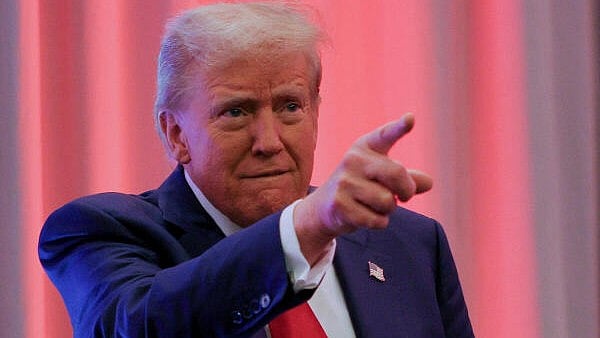
US President-elect Donald Trump
Credit: Reuters Photo
The return of Donald Trump to the forefront of American politics may once again bring climate inaction to the fore, not because of the policies or beliefs he directly enacts, but as a convenient shield for other developed nations to justify their own stalling on climate promises.
Even though the climate scepticism and resistance to robust environmental policies that Trump symbolises are well-known, the bigger concern is that his stance offers an excuse for other nations to backslide or avoid accountability for commitments that were already fragile at best. The collective result could be a dangerous retreat from global climate responsibilities, masked by a single polarising figure but symptomatic of a larger failure.
For years, the West has made lofty pledges on climate finance, promising billions to assist developing countries in adapting to the very consequences of climate change that they bear little responsibility for causing. Yet, these promises have often remained just that – promises. The repeated calls from vulnerable nations, often facing the brunt of climate-induced disasters, for the timely and adequate delivery of pledged funds have been met with delays, diluted targets, and vague reassurances.
Trump’s return now risks being used as a convenient scapegoat, allowing other developed countries to sidestep both the urgency and the moral imperative of their obligations. If Trump’s climate stance provides cover for others to defer or downscale their efforts, the failure of collective action will weigh heavily on us all.
The developed nations have long betrayed any sense of moral ground in their approach to climate action, betraying both their historical responsibility and their ethical obligations to the global community. Over the years, Western and developed economies have made ambitious climate finance promises, yet the reality of their commitments has often fallen short.
At the 2009 Copenhagen Climate Summit, developed nations pledged to mobilise $100 billion per year by 2020 to assist developing countries in mitigating and adapting to climate change. Moreover, when climate funds are allocated, they are frequently channelled through complex, bureaucratic pathways, resulting in less impact than originally pledged.
On November 15, news reports suggested that at the ongoing COP29, India, on behalf of the developing countries, said that developed countries need to raise $1.3 trillion every year till 2030 without inhibiting developing countries to ‘growth-inhibiting’ conditions.
The Western world’s lack of concrete follow-through has already strained relations with the Global South, where populations bear disproportionate risks and costs despite contributing minimally to the crisis. Trump’s stance only reinforces a deeper narrative: developed nations continue to treat climate finance not as an ethical imperative but as a negotiable obligation, contingent on shifting political tides.
The European Union, for example, has repeatedly set aggressive climate goals, including achieving ‘net-zero’ emissions by 2050, but its implementation has been criticised for delays and vague plans. In 2015, during the Paris Agreement, Western countries promised a significant increase in climate finance, but in the years following, progress has been sluggish, with promises often falling victim to political changes and economic priorities. The United States, under President Barack Obama, committed to contributing a significant portion of the $100 billion target, but Trump’s withdrawal from the Paris Accord saw a reversal, and Joe Biden’s administration has only partially restored some of those commitments.
Meanwhile, Canada and Australia, despite their resource-rich economies, have been criticised for not following through on their climate pledges; instead prioritising fossil fuel extraction. This pattern of under-delivery has created an ongoing trust deficit in the Global South, where the lack of financial support has left many vulnerable nations unable to tackle the growing threats of climate change.
As political economist and philosopher John Stuart Mill once said, “A person who has nothing for which he is willing to fight, nothing which is more important than his own personal safety, is a miserable creature.” This can be applied to the West’s climate inaction; it exposes a deeper moral failure — an inability to prioritise the well-being of future generations and the planet itself over short-term political and economic interests.
If we examine the climate summits over the years, it’s evident that many developed countries rely on verbose rhetoric to create the appearance of progress while obfuscating the actual metrics. They employ terms like ‘net zero’, ‘green growth’, and ‘just transition’, but seldom deliver tangible policies to bridge the words and the urgent actions needed. Trump’s position on climate may well allow others to amplify this ambiguity, using him as the personification of denialism to distract from their own shortcomings. Even when Trump was out of office, major economies did not make radical strides; they simply avoided an outright regression in dialogue.
The excuse-making and finger-pointing around climate policy underscores a more uncomfortable truth: even beyond Trump, the willpower to meet ambitious climate targets in the Western world has waned. Trump merely represents a version of climate delay that is overt; far more pernicious is the latent, insidious delay found in selective implementations, conveniently extended timelines, and redefined goals from other world powers. This normalisation of climate apathy, which many Western economies tacitly engage in, could find new momentum under a Trumpian umbrella.
Developing nations are watching closely, and the consequences of a climate stalemate stretch beyond ecological damage. Economic inequities will be exacerbated, and trust among international stakeholders will erode. If the Western world truly wishes to lead on climate change, it must distance itself from Trump’s approach rather than align itself, even passively, with the lack of urgency he represents.
Climate action demands a moral consistency that goes beyond political leaders and remains steadfast regardless of who occupies powerful positions. We must see Trump’s return as an indictment not merely of one nation’s political climate but of the fragility of collective climate commitments when tested by opportunism and convenience.
(Srinath Sridharan is a policy researcher and corporate adviser. X: @ssmumbai.)
Disclaimer: The views expressed above are the author's own. They do not necessarily reflect the views of DH.